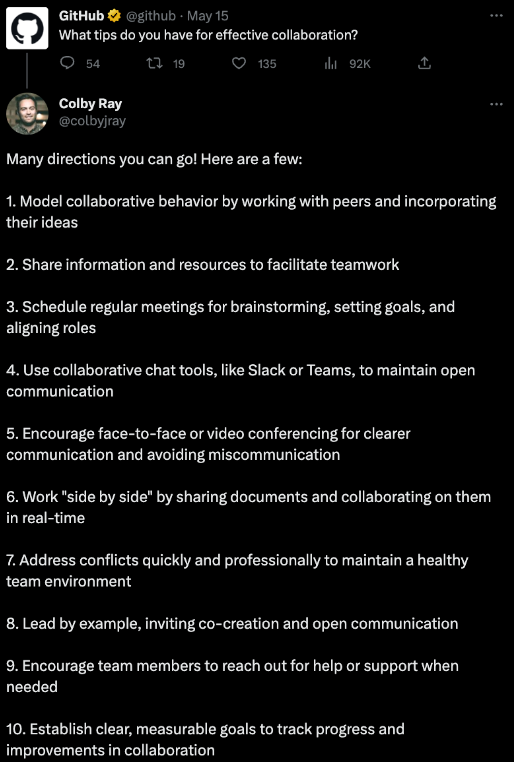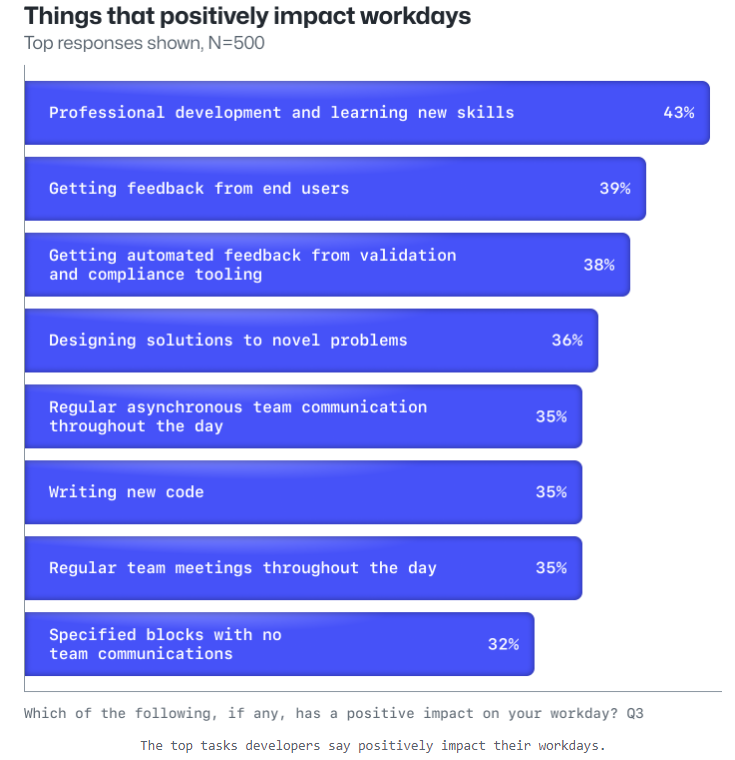
A developer sitting down to code (Source – Shutterstock)
How developers are revolutionizing coding and exceeding standards with AI
- Collaboration is key to a great developer experience.
- AI coding tools improve code quality and speed, according to GitHub research.
In today’s dynamic landscape, developers equipped with traditional coding skills are also tasked with navigating the emerging domain of generative artificial intelligence (AI) coding tools as they expand their roles beyond software deployment.
However, what truly matters for developers goes beyond metrics like story points or deployment speed. The paramount factor is the developer experience, as it directly impacts their ability to exceed standards, enter a productive flow state, and make a meaningful impact.
To gain insights into the effect of new tools and workflows on the overall developer experience, GitHub surveyed the rapidly advancing field of generative AI. The survey involved 500 developers from U.S.-based companies with over 1,000 employees. The results revealed developers’ widespread adoption of AI tools and their influence on individual productivity, team collaboration, and the need for reevaluating performance measurement in engineering leadership.
Exploring the impact of AI tools on developers
GitHub aimed to understand developers’ typical experiences better and identify ways for companies to empower their developers and achieve greater success. Collaboration emerged as a central element, highlighting how developers prefer to work and what makes them productive, satisfied, and impactful.

GitHub wants to learn more to improve developers’ experience (Source – Github)
The concept of developer experience (DevEx) encompasses several key factors:
- The ease and speed with which developers can implement changes on a codebase, enabling productivity.
- The seamless transition from idea to production, leading to impactful outcomes.
- The positive or negative effects of the work environment, workflows, and tools on developer satisfaction.
For leaders, creating a collaborative environment where developers can be productive, impactful, and satisfied is essential for fostering a great developer experience. Collaboration is a critical aspect of this equation for developers themselves.
The survey findings revealed that 92% of developers are already leveraging AI coding tools in their work. The majority, 70%, recognized the advantages offered by these tools, driving their increased adoption. Developers identified various benefits associated with AI coding tools, including enhanced collaboration within teams and organizations, improved coding language skills, increased productivity through automation, more time for solution design and creativity, and potential support in preventing burnout.
Regarding performance evaluation, the survey indicated that one-third of developers are currently assessed based on code volume. Other commonly used metrics include code quality, speed of completion, production incidents, and bug resolution. However, as AI tools become more prevalent in software development, leading to increased code volume, engineering leaders must reconsider whether measuring code quantity remains the most effective approach to gauge productivity and output.
Developers’ desire for upskilling and making an impact
GitHub’s research shed light on developers’ perspectives regarding how AI coding tools can help them meet performance standards by delivering improved code quality, faster outputs, and fewer production-level incidents. Developers expressed the need for performance measurement to extend beyond code quantity and emphasized metrics such as collaboration and communication, code quality, bug resolution, time to complete tasks, test coverage, and the velocity and quality of feature delivery.
Developers strongly desire more opportunities to upskill and make a significant impact in their work. When asked about the factors that positively influence their workday, they prioritize learning new skills (43%), receiving feedback from end users (39%), automated tests (38%), and designing solutions to novel problems (36%).

Things that positively impact workdays (Source – GitHub)
The survey reveals that enterprise developers are engaged in various daily tasks, such as writing code, addressing security vulnerabilities, and seeking end-user feedback. Interestingly, developers allocate similar amounts of time to these tasks, indicating insufficient time and resources.
Developers beyond code writing
Importantly, developers report spending as much time waiting for builds and tests as writing new code. This suggests that despite advancements in DevOps tools, the persistent problem of wait times for builds and tests remains. Additionally, developers face obstacles like waiting for code review, builds, and test runs, which hinder their ability to learn new skills and tackle unique problems. Research indicates that these factors significantly impact their overall satisfaction.
While developers highly value feedback from end users, they encounter challenges in obtaining it directly. Product managers and marketing teams often act as intermediaries, making it difficult for developers to receive end-user feedback directly. Ideally, developers would like input from automated and validation tests to improve their work, but sometimes these tests are routed to other teams before reaching the engineering teams.
Inbal Shani, Chief Product Officer at GitHub, emphasized that developers today go beyond mere code writing and shipping. They are expected to navigate various tools, environments, and technologies, including the exciting realm of generative AI coding tools.
“The most important thing for developers isn’t story points or the speed of deployments. It’s the developer experience, which determines how efficiently and productively developers can exceed standards, enter a flow state, and drive impact,” said Shani. “Ultimately, the way to innovate at scale is to empower developers by improving their productivity, increasing their satisfaction, and enabling them to do their best work — every day. After all, there can be no progress without developers who are empowered to drive impact.”
READ MORE
- Strategies for Democratizing GenAI
- The criticality of endpoint management in cybersecurity and operations
- Ethical AI: The renewed importance of safeguarding data and customer privacy in Generative AI applications
- How Japan balances AI-driven opportunities with cybersecurity needs
- Deploying SASE: Benchmarking your approach


